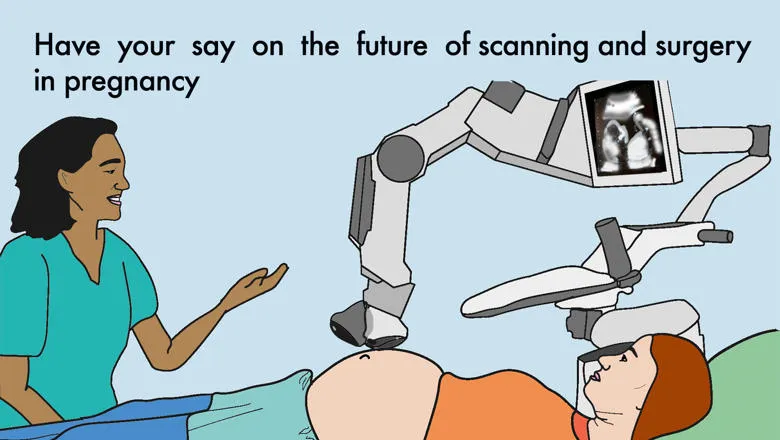The Public Engagement team at the Wellcome/EPSRC Centre for Medical Engineering (CME) at King's College London hosted a series of workshops to explore public views on innovations in scanning and surgery during pregnancy.

The Public Dialogue on Scanning and Surgical Innovations in Pregnancy took place in March and April 2021. Over the course of two waves of online workshops, invited members of the public shared their views, hopes and fears regarding novel technologies that could help improve the diagnosis and treatment of conditions babies may develop in the womb.
The discussions focused on ongoing research from two projects co-located in the CME: Guided Instrumentation for Fetal Therapy and Surgery (GIFT-Surg), a project that develops techniques, technology and training to improve surgical interventions for babies diagnosed with specific conditions in the womb; and Intelligent Fetal Imaging and Diagnosis (iFIND), which uses advanced medical imaging to improve screening and diagnosis of fetal conditions.
The initiative was led by Alice Taylor-Gee, Public Engagement Manager at the School of Biomedical Engineering & Imaging Sciences, King's College London.
Alice Taylor-Gee said: "By using the public dialogue approach, participants had space to share their experiences, express their views, and researchers could then find out what really matters to them - making this a truly two-way engagement."
The first workshop brought all participants together to explore developments in scanning and surgery in pregnancy. In small break-out groups, attendees discussed their initial thoughts, concerns and questions around these and how they may change the parent experience.
The second round of workshops saw the participants split into parents who have experienced a pregnancy of a baby with a condition that was diagnosed in the womb and parents who have not. Participants were presented with future scenarios that developments could lead to; for example, in one of these, parents would visit their local GP surgery for an ultrasound scan where an artificial intelligence (AI) algorithm would analyse the data to a higher level of detection rate than is currently possible. Participants explored which elements they liked about the scenarios, what they didn't feel comfortable with, and the ethical and personal implications relating to early diagnosis of conditions, AI and interventions during pregnancy.
GIFT-Surg charity partner Antenatal Results and Choices (ARC) has been involved in the project from the start. They helped to enlist participants who had a condition diagnosed in pregnancy and also delivered training on sensitive communication around prenatal diagnosis and decisions for researchers across the CME.
Jane Fisher, Director of ARC said: "We have been happy to help the project team better understand the perspective of women and their partners who face unexpected and difficult news from antenatal scans. We know that our community really valued their voices being heard."
The workshops generated highly positive feedback, with several members of the public highlighting the value of learning about new research on the future of scanning and being able to talk to professionals in the field. Many of them particularly appreciated having their views "wanted and respected" and the opportunity to help others by sharing their experiences as well.
Participating researchers and clinicians also emphasised the ways in which they benefited from the process. Dr Andrew Melbourne, Senior Lecturer at King's College London said: "As an engineer, sometimes you can forget quite how specialised some of the knowledge being generated within these projects can be, and it is important not to become disconnected from the real healthcare challenges. I hope that my increased awareness of wider opinion on the work will help to enhance my communication of the incredible research that is being done as part of GIFT-Surg."
GIFT-Surg charity partner Antenatal Results and Choices (ARC) has been involved in the project from the start. They helped to enlist participants who had a condition diagnosed in pregnancy and also delivered training on sensitive communication around prenatal diagnosis and decisions for researchers across the CME.
Jane Fisher, Director of ARC said: "We have been happy to help the project team better understand the perspective of women and their partners who face unexpected and difficult news from antenatal scans. We know that our community really valued their voices being heard."
The workshops generated highly positive feedback, with several members of the public highlighting the value of learning about new research on the future of scanning and being able to talk to professionals in the field. Many of them particularly appreciated having their views "wanted and respected" and the opportunity to help others by sharing their experiences as well.
Participating researchers and clinicians also emphasised the ways in which they benefited from the process. Dr Andrew Melbourne, Senior Lecturer at King's College London said: "As an engineer, sometimes you can forget quite how specialised some of the knowledge being generated within these projects can be, and it is important not to become disconnected from the real healthcare challenges. I hope that my increased awareness of wider opinion on the work will help to enhance my communication of the incredible research that is being done as part of GIFT-Surg.
Getting feedback, input and ideas on the iFIND and GIFT-Surg projects from people who were so committed to sharing their experience, was hugely valuable. Seeing how the facilitators made sure everyone involved in the focus groups felt valued and had their voices heard was a great learning point for me and something I hope to take forward.– Dr Jackie Matthew, Clinical Academic Sonographer at King's College London
Professor Anna David, Professor of Obstetrics and Maternal Fetal Medicine at UCL said: "Interacting with patients and the public through this dialogue has allowed us to better understand how to bring new imaging technologies into the clinic. Automating fetal scanning and therapy to improve accuracy is acceptable, but human interaction to interpret the results will continue to be important."
The findings from the discussions will be released in an anonymised report, which is being shared with leaders in the field to improve scanning and surgical interventions in pregnancy for parents and babies in the future.






